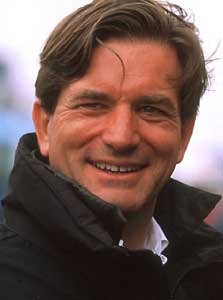Features - News Feature
NOVEMBER 13, 2000
Who is Thomas Haffa and why does it matter to F1 fans?
BY JOE SAWARD

We have a habit of going on about a man called Thomas Haffa and a company he owns called EM.TV. By why should race fans care about him? And who is he anyway?
Haffa is a 48-year-old German. He dropped out of high school in his teens and went to work for the BMW car company. It was nothing glamorous. When he was 21 he wanted a change and joined IBM as a door-to-door salesman, trying to convince people to buy typewriters and early computers. He stayed for seven years and learned what it takes to be a salesman. And then he joined Leo Kirch's media empire, being one of the staff who was building up the home video business. Haffa moved quickly through the management and ended up as Kirch's right hand man, looking after the video business and Kirch's merchandising and music publishing businesses. In 1989 he went out on his own and began acquiring the German language rights to an assortment of cartoon characters owned by Hanna Barbera and Warner Brothers. Initially he worked as an agent for the big companies but then began to buy the rights himself and was soon selling English-language cartoons to TV networks all over the world. Haffa's early success was built not only by the revenues he generated from TV sales but also from copyrighting and trademarking the characters he controlled in every possible form and then selling merchandise which included toys, books, clothing, games and videos. EM.TV's portfolio included the European rights to Tom & Jerry, Elvis Presley, James Bond, Nintendo, Popeye, the Ninja Turtles, the Pink Panther, Betty Boop and Woody Woodpecker. Having built up a library of over 12,000 hours of programming, he then began to produce his own cartoons including Tabaluga, a German version of Barney. In October 1997 he floated half the company on the Neuer Markt, Frankfurt's version of the NASDAQ.
In partnership with his old employer Leo Kirch, Haffa started Junior TV in 1999. This was designed to rival Cartoon Network and then in February 2000 he spent $680m to buy The Jim Henson Company from Brian, Lisa, Cheryl, John and Heather Henson. The acquisition added another 450 hours of programming to EM.TV' library including The Muppet Show and Sesame Street. Included in the deal was Jim Henson's Creature Shop, which has won Oscars for its model making and computer graphic work and over 5000 licensed Muppet products.
A month later Haffa crowned his rise to fame by buying half of Bernie Ecclestone's Formula One group of companies for $1.6bn. His intention, it seems, was to take the money from Formula 1's TV revenues and at the same time create more value for the company by doing deals with the teams to merchandise Formula 1 and those involved in the sport centrally. This was a good idea but "Kermit" as he soon became known amongst the F1 team bosses found that there was almost no interest in letting an outsider merchandise the sport. They all had different target audiences and the only thing they had in common was that they all wanted to make money.
This left Haffa with some big debts to be repaid and not as much potential for earnings as he had hoped there would be and soon the EM.TV shareholders began to express doubts as to the wisdom of the move. By the midsummer Haffa was talking about selling his Formula 1 shares. He said that he wanted $2bn for them but there was no-one willing to pay the price being asked. A consortium of car manufacturers and Formula 1 teams began to sniff around the deal but progress was slow. Haffa's share price slid quietly until September when the company announced its first half results for 2000. The company had made profits of $50m. It was not bad at all. The only problem was that when people began looking into the results, they discovered that the accounting was all over the place. Some of F1's revenues had been included from before Haffa had even bought the company. EM.TV announced that it would have to release new accounts. The share price tumbled 30% in a week and has been dropping gradually ever since. Shares are now worth only a fraction of what they worth in the Spring.
Haffa does not have to sell because he controls 51% of the company but there is no doubt that investors want him out. The shares are worth less than half of what they should be given the assets the company owns. It is getting to a point where banks may decide to move against Haffa for fear that the company will collapse completely. Haffa is under pressure to go and it is in his interest to do so as his own shares would then increase in value dramatically, but he does not want to let go.
In the meantime, Formula 1 is watching and waiting. Haffa is only significant in that he owns an option to buy 25% more of the Ecclestone companies and, depending on the conditions, this could give him (or a buyer of EM.TV or of the F1 shares) effective control of the commercial aspects of the sport. Ecclestone may have clauses in the option to veto the sale of that option to another person but the only definite block to that is in the FIA contract with the Formula One companies which allows the government body to cancel the commercial contracts if it does not like the look of the people who take over the business.